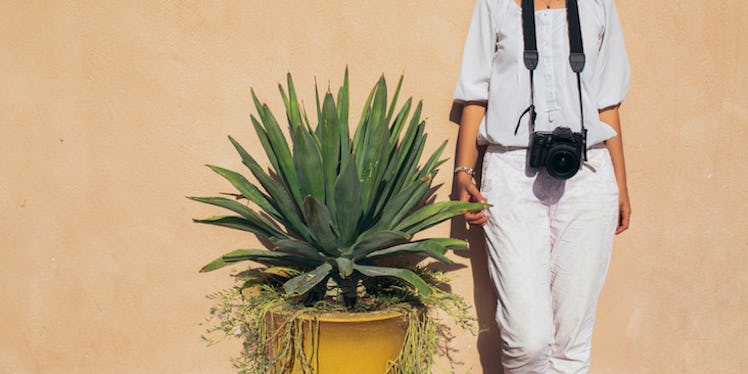
Despite Its Benefits, This Is Why You Probably Shouldn't Be Eating Aloe Plants
You may have seen a recent video of 26-year-old Chinese vlogger Ms Zhang, who mistakenly ate a poisonous plant she believed to be aloe vera.
In the video, you can watch as she begins to chomp down on the plant, but after noticing its particularly bitter taste, the livestream comes to a halt.
Ms Zhang was subsequently brought to the hospital, as she had suffered from throat and mouth burns, and even blisters.
Vice reported that the plant was actually an agave americana plant, which is poisonous and known to cause damage to the kidney and liver.
Fortunately, Ms Zhang made it through the scary experience, though not before she had to have her stomach pumped.
Yikes.
It's a mistake that could have happened to anyone, but one that also could have likely been prevented with just a little more research.
After all, it's hard not to be swayed by seemingly magical beauty products and wellness trends promising beautiful skin and an overall better way of life.
Plenty of wellness bloggers have advocated for eating raw aloe vera to reap its litany of health benefits.
Some believe that ingesting raw aloe vera can treat a whole slew of bodily issues, such as irritable bowel syndrome, acne, and even kidney disease and certain cancers.
And it's true that aloe vera, a cactus-like plant that grows in desert climates, has long been used for its believed medicinal properties, both internal and external.
That being said, there's really not a whole lot of science to back up all of aloe's claimed healing properties, and there are, in fact, some studies that claim quite the opposite -- that the plant has toxic, and maybe even carcinogenic qualities.
According to Mayo Clinic, some potentially dangerous and unpleasant side effects have been known to be associated with aloe vera.
Some such side effects include stomach cramping, diarrhea, hives, or even excess bleeding, to name a few.
It's not recommended to eat aloe vera in large quantities, so if you ever do happen to experiment with the plant, you should definitely be sure to proceed with caution.
The mixture of wellness information on the internet can be pretty confusing and contradictory. It seems like every health “trick” and their uncle is at once a miracle cure-all, a terrible danger, and completely useless.
Which is kind of the lesson to take from this unfortunate, poisonous-plant-eating incident: Be wary of taking medicinal advice from non-professionals.
Vice spoke to Tim Caulfield, Canada Research Chair in Health Law and Policy at the University of Alberta, about the pervasive belief that, because something is natural, it means it's inherently better.
It is a myth that all chemicals are bad, and all that comes from the dirt is good:
The underlying assumption is that if it's natural it's healthy and safer than things produced by humans. But that just isn't the case. It's a fallacy.
Consider this your reminder to always do your own independent research whenever you're embarking on a new diet or experimenting with a new health trend.
I mean, you're the one putting these things into your body. Don't you want to know what the hell it really is?